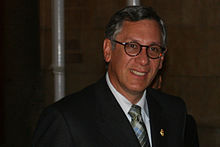Eduardo Rodríguez
| Eduardo Rodríguez Veltzé | |
|---|---|
 |
|
| 79th President of Bolivia | |
|
In office 9 June 2005 – 22 January 2006 |
|
| Vice President | Vacant |
| Preceded by | Carlos Mesa |
| Succeeded by | Evo Morales |
| Personal details | |
| Born |
March 2, 1956 Cochabamba, Bolivia |
| Nationality | Bolivian |
| Political party | Independent |
| Spouse(s) | Fanny Elena Arguedas |
| Alma mater |
University of San Simón Harvard University |
| Religion | Roman Catholicism |
Eduardo Rodríguez Veltzé (born March 2, 1956) is a former president of Bolivia; prior to that appointment he was the chief justice of the Supreme Court.
Born in Cochabamba in 1956, Rodríguez is a lawyer and holds a master's degree in public administration. He studied at Colegio San Agustín; later he studied law at the Universidad Mayor de San Simón in Cochabamba and obtained his Master of Public Administration at Harvard University's John F. Kennedy School of Government.
In 2005, after weeks of civil unrest led by Evo Morales, former president Carlos Mesa offered his resignation to Congress. After Hormando Vaca Diez and Mario Cossío, presidents of the Senate and Chamber of Deputies, respectively, were forced by protestors to decline the post, Rodríguez — as head of the judiciary and fourth in the line of succession — became the country's new president on June 10, 2005. Rodríguez was inaugurated with the constitutional mandate to call elections within one year's time.
Rodríguez's time in office ended with the inauguration of Evo Morales in January 2006, following the victory of Morales in the presidential election of the previous month.
Under the Morales administration, Rodriguez has been charged with treason following the decommissioning of missiles during his term in office. Bolivia bought about 30 HN-5 shoulder-launched missiles from China in 1993 or 1998. By 2005 they had become obsolete and Rodriguez made the decision to destroy them; he says he did not know the United States would be the ones to be given the missiles for destruction. Before taking office, Morales charged that the transfer amounted to putting the country "under foreign domination."
...
Wikipedia
